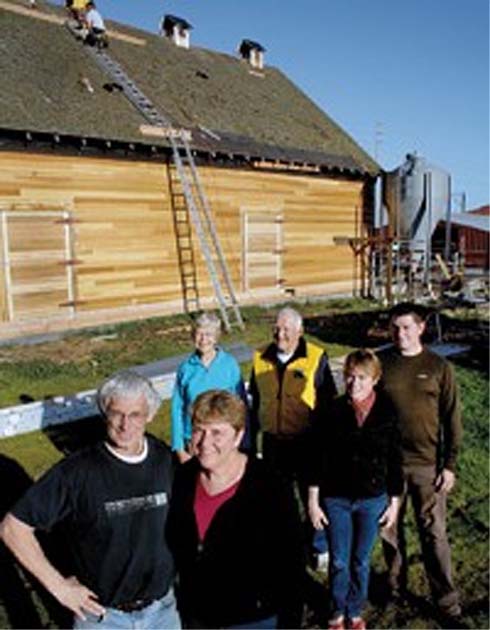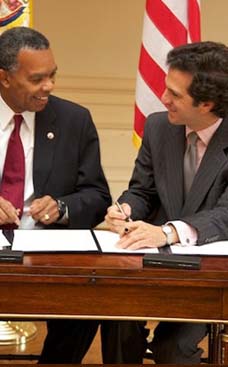
Clark and Lauren both attended Washington State University and initially pursued degrees that had nothing to do with agriculture. But something seemed to click for Lauren, who was majoring in both communications and women's studies. "I was tired of theory," she said. "I wanted something concrete." So she added a degree in soil science. She and Clark didn't plan on returning to Whidbey Island, but after spending two years in the Peace Corps in Moldova, part of the former Soviet Union that is located between Romania and Ukraine, they changed their minds. Moldova was once considered the breadbasket of the Soviet Union, Clark explained, but after the fall of the Soviet Union, the region was left in chaos. The land was eventually divided into small tracts and distributed to farmers in the belief that such a move would be the most equitable, but the division destroyed the large-scale acreage needed for economic success. "After being with farmers who had too little land and too many regulations to be able to make a living farming, I thought of what we had back here and thought, why would you waste it?" Hubbard said. "You leave Whidbey and it draws you back," Clark said.
Wilbur and Karen Bishop spent their honeymoon and the following two years as Peace Corps volunteers in Botswana. Bishop's son Clark and his wife Lauren Hubbard spent two years in the Peace Corps in Moldova.
Three generations on the prairie
Sherman-Bishop clan reflects on farming, family and the future
By Toni Grove
Examiner Staff Writer
Caption: Wilbur and Karen Bishop, Phyllis and Al Sherman, Lauren Hubbard and Clark Bishop stand in front of the LeSourd barn, which was built in 1923 and is being restored through a Washington Heritage Barn Grant. Clark, the son of Wilbur and Karen, is a sixth-generation descendant of early Ebey's Prairie pioneers Mary and Francis LeSourd. Photo: Kasia Pierzga / The Whidbey Examiner
Thanks in part to three generations of Shermans and Bishops, farming remains alive and well on Ebey's Prairie.
The families want to share how they've navigated the changing landscape of agriculture on Whidbey Island.
Wilbur Bishop, who with his wife Karen owns Ebey Road Farm on what was the original land donation claim of Isaac Ebey and William Engle, says it's largely due to a combination of luck and circumstance.
But it's also clear that their continued success requires planning, a passion for community and a continuing commitment to stewardship of the land.
There would be fewer opportunities to farm the prairie today if Al Sherman, Karen's father, hadn't traveled to Austria in 1952 as an International Farm Youth Exchange student.
After Sherman and his wife Phyllis joined the family turkey farm, where up to 100,000 gobblers a year were raised into the 1970s, he remembered how much Europeans respected and valued their farmland.
"There's farmland that's been there for thousands of years," Sherman said, "and they plan on keeping it that way. They don't put houses on it lightly."
Houses are exactly what were planned in the early 1970s for the Smith Farm, adjacent to Sherman's land, when the weight of estate taxes drove the Smith family to make plans for residential development.
Sherman said it may have looked hopeless to some, but "other people had more vision to save the land."
Through local activism and an act of Congress, Ebey's Landing National Historical Reserve was created in 1978 and the Smith farmland was preserved.
Karen Bishop, who has an office job as the director of the Whidbey Island Conservation District, said it's critical for farmers to plan ahead for what will happen to their land after they die.
"In order for farms to go down through the generations, we have to be proactive," she said. "You can't die in the saddle."
Wilbur Bishop explained that when the Reserve was created, the National Park Service bought the Smith farm and traded it to the Sherman family for the development rights to their land. The swap ensured both properties would remain in agricultural production.
"We were the first ones to transfer development rights," Sherman said. "The family had to make that decision."
"Economically, it probably wasn't the best decision," he said. But he said he's convinced it was the best decision for preserving farmland in Ebey's Prairie.
Consolidation of the Smith and Sherman properties into a larger farm was what made staying and farming on Whidbey Island look more promising, Wilbur said. Despite his deep roots on Whidbey, he admitted he at one time considered moving to Garfield in Eastern Washington to farm his family's original homestead.
Karen Bishop noted that when any family business gets more and more generations involved in it, everyone's values and goals may no longer be compatible.
"When you go down the generations you get farther apart," she said. "The dynamics change."
The younger generation may be planning into the future and the older generation may be planning for their retirement, she said. For a family business to thrive you have to be in sync and share the same goals for the business.
What the Reserve and families like the Shermans and Bishops have helped accomplish is preserving and consolidating pieces of Ebey's farming mosaic.
Some farmers and farm organizations that are focused on property-rights issues, such as the Washington State Farm Bureau, have learned to be supportive of how the Reserve is preserving farmland by buying development rights, Wilbur Bishop said, although there has been a learning curve. The Farm Bureau's main concern, Bishop explained, is adequate compensation for property value.
"Agriculture has had a hard time grasping the concept we have here," he said, adding that he thinks it's time for that view to change.
Karen emphazised that her family is passionate about land remaining in private hands.
"People don't understand that the land is privately owned," she said of her farm and others in the Reserve. "Private land is cared for differently than public lands."
There's a strong vein of international service in this family, and in those who marry into it. Wilbur Bishop has a degree in agricultural education and became an International Farm Youth Exchange student in India in 1976. Later he and Karen, who holds a degree in business operations and management, spent their honeymoon and the following two years as Peace Corps volunteers in Botswana.
"We taught agriculture at a government boarding school to 800 kids," Karen Bishop said. "We were on the edge of the Kalahari Desert and taught people to grow food who didn't have enough."
Like her father, Karen wanted to farm, which was a good thing for Wilbur Bishop.
"Who you marry is very critical," Karen said. "You have to live it and enjoy it."
If she didn't have a passion for farming, she admitted, she would never have made it through another harvest.
The decision to become farmers wasn't so clearcut for the Bishop's son Clark and his wife Lauren Hubbard who moved to Whidbey Island from Seattle when she was in middle school.
"I was the only farm kid in my high school class," said Clark, now 26.
Karen said kids who didn't grow up on a farm had a hard time understanding that Clark was needed at home. When he was growing up, there were no agricultural programs for children on the island.
Today, Karen said, there are still few opportunities for children to learn about farming, and state labor laws make it almost impossible for minors to learn farming if they're not born into a farming family.
"We need to work hard to promote that to kids," she said.
Wheat, squash, turkeys and more had been raised over the decades on the family farm, but by the time Clark Bishop was doing his fair share, the focus had shifted to dairy cows.
Clark and Lauren both attended Washington State University and initially pursued degrees that had nothing to do with agriculture. But something seemed to click for Lauren, who was majoring in both communications and women's studies.
"I was tired of theory," she said. "I wanted something concrete."
So she added a degree in soil science.
She and Clark didn't plan on returning to Whidbey Island, but after spending two years in the Peace Corps in Moldova, part of the former Soviet Union that is located between Romania and Ukraine, they changed their minds.
Moldova was once considered the breadbasket of the Soviet Union, Clark explained, but after the fall of the Soviet Union, the region was left in chaos. The land was eventually divided into small tracts and distributed to farmers in the belief that such a move would be the most equitable, but the division destroyed the large-scale acreage needed for economic success.
"After being with farmers who had too little land and too many regulations to be able to make a living farming, I thought of what we had back here and thought, why would you waste it?" Hubbard said.
"You leave Whidbey and it draws you back," Clark said.
Three and a half years ago, Wilbur and Karen divided the family farm with Don and Deb Sherman and the dairy cows were sold off. It was the easiest and most equitable way to split the farm, Bishop explained. Otherwise, one of them would have had the expense of providing the infrastructure needed to keep the dairy in operation.
The shift from dairy to primarily hay and grain also made it more appeal ing for the next generation to return, Hubbard said.
That's in part because, as it turns out, Clark Bishop is allergic to cattle.
It also helps that a hay and grain operation is a lot less labor-intensive than dairy.
"Dairy is hard," Hubbard said. "You can make a good living, but it's a hard living."
Karen said farming on Whidbey is undergoing considerable changes.
"The lines are blurring between larger and smaller size agriculture," she said.
New farmers bring in new energy, she said, and some of them have recruited interns who hope eventually to run their own farms. And she believes that society is finally recognizing the value of local food production and the market for organically grown produce continues to expand.
Wilbur and Karen Bishop recognize the growing interest in organics and have begun to devote some resources to organic farming, but they also have decades of experience that drive the decisions they must make.
"There are conventional tools that are more sustainable than organic," Wilbur said.
Karen easily sums up the care her family has put into ensuring their farm will be around for the next generation that may want to join the family farm.
"You build a successful business into the future," she said.













